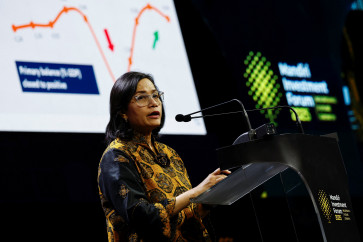Popular Reads
Top Results
Can't find what you're looking for?
View all search resultsPopular Reads
Top Results
Can't find what you're looking for?
View all search resultsShanghai records hottest May day in 100 years
Shanghai residents sweltered under the early afternoon sun, with some apps showing a "feels like" temperature estimate of more than 40 degrees.
Change text size
Gift Premium Articles
to Anyone
S
hanghai recorded its hottest May day in 100 years on Monday, the city's meteorological service announced, shattering the previous high by a full degree.
Scientists say global warming is exacerbating adverse weather, with many countries experiencing deadly heat waves and temperatures hitting records across Southeast and South Asia in recent weeks.
"At [1:09 p.m. local time], the temperature at Xujiahui station hit 36.1 degrees Celsius, breaking a 100-year-old record for the highest temperature in May," a post on the service's official Weibo account read, referring to a metro station in the center of China's largest city.
The temperature at the bustling station climbed even higher to 36.7 degrees later in the afternoon, Shanghai's meteorological service said.
That put it a full degree above the old record, 35.7 degrees, which had been recorded four times previously, in 1876, 1903, 1915 and 2018, according to the weather service.
Shanghai residents sweltered under the early afternoon sun, with some apps showing a "feels like" temperature estimate of more than 40 degrees.
"I headed out at noon to pick up a delivery, and got a headache after coming back," read one post from Shanghai on Weibo.
Another said, "I almost got heatstroke, it's really hot enough to explode."
Deadly heat
Parts of India saw temperatures above 44 degrees in mid-April, with at least 11 deaths near Mumbai attributed to heat stroke on a single day.
In Bangladesh, Dhaka suffered its hottest day in almost 60 years.
The city of Tak in Thailand recorded its highest-ever temperature of 45.4 degrees, while Sainyabuli province in Laos hit 42.9 degrees, an all-time national temperature record, the study by the World Weather Attribution group said.
A recent report from the United Nations' Intergovernmental Panel on Climate Change warned that "every increment of global warming will intensify multiple and concurrent hazards".
In May, the United Nations warned that it was near certain that 2023 to 2027 would be the warmest five-year period ever recorded, as greenhouse gasses and El Niño combine to send temperatures soaring.
There is a two thirds chance that at least one of the next five years will see global temperatures exceed the more ambitious target set out in the Paris accords on limiting climate change, the UN's World Meteorological Organization (WMO) said.
The 2015 Paris Agreement saw countries agree to cap global warming at "well below" 2 degrees Celsius above average levels measured between 1850 and 1900 – and 1.5 degrees if possible.
The global mean temperature in 2022 was 1.15 degrees above the 1850-1900 average.
The WMO said there was a 66 percent chance that annual global surface temperatures would exceed 1.5 degrees above pre-industrial levels for at least one of the years from 2023-2027.










